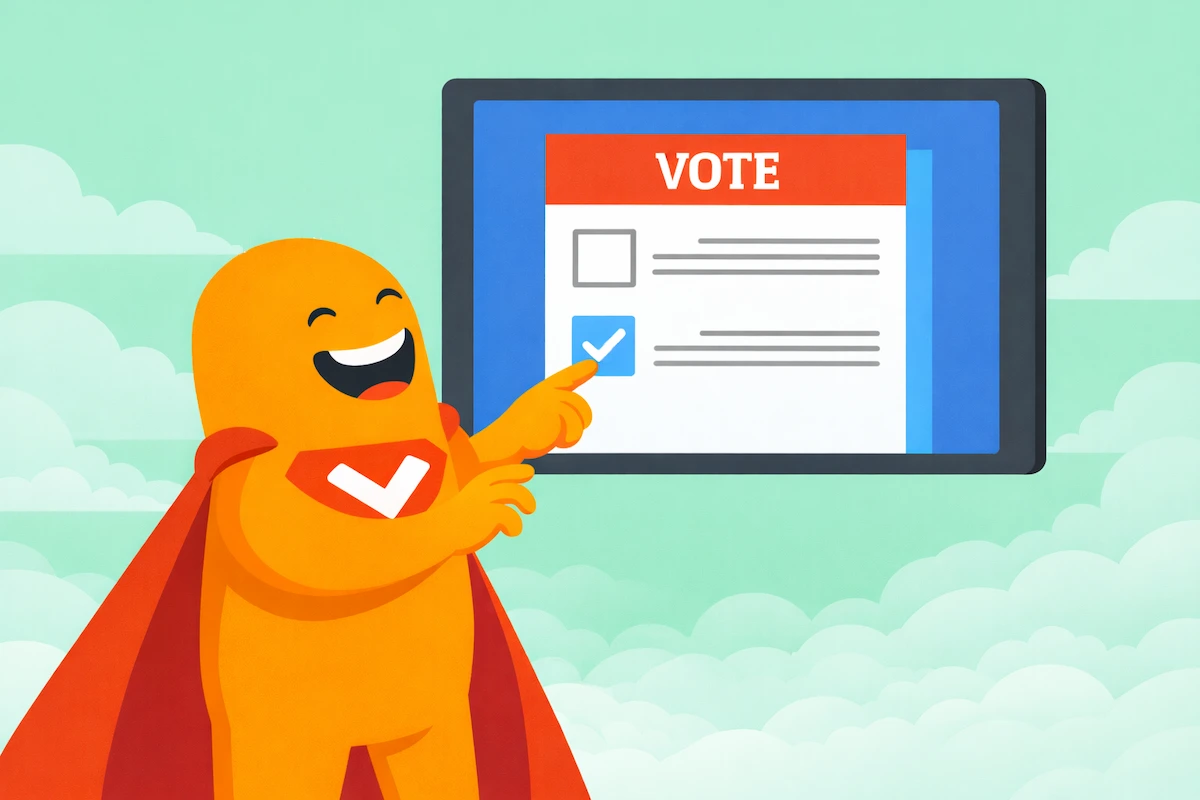Online balloting offers organizations a secure, efficient, and cost-effective way to conduct elections, from selecting board members to student or club leadership votes. Online voting systems eliminate paper costs, reduce errors through automated vote counting, improve voter turnout, and provide real-time reporting.
With secure encryption, access controls, and voter verification, modern online ballots address many traditional election challenges while increasing fairness and accessibility. Using survey-based tools like SurveyLegend, organizations can easily design ballots, manage electoral rolls, restrict duplicate voting, and analyze results instantly—making online balloting a practical solution for transparent and inclusive decision-making.
Introduction to Online Voting System
An online voting system is a secure, web-based platform designed to make elections more accessible and efficient for eligible voters. With an online voting system, voters can cast their ballots from anywhere in the world using their computer or mobile devices, eliminating the need to be on site or handle paper ballots.
The process is straightforward: eligible voters simply log in to the voting website during the designated voting period, review the ballot, and submit their vote with just a few clicks. Advanced security measures, such as encrypted connections and SSL technology, ensure that every vote remains confidential and tamper-proof. By streamlining the voting process and making it easy for voters to participate, online voting systems help organizations, schools, and businesses conduct smooth, trustworthy elections.
Support for Online Voting Increases
In our recent blog, Online Voting for Elections During the Coronavirus, we discussed how the call for social distancing had put discussions about an online voting system into overdrive. Rather than come together in person to cast a vote and risk spreading COVID-19, many believed free online election voting using an online ballot was the way to go.
Not only would an online voting system help to contain the virus, but it would also eliminate common voter suppression tactics, which the New York Times highlighted as a major problem.
“Messing with polling stations is one of the most common voter suppression tactics,” wrote Alex Tapscott, Co-Founder of the Blockchain Research Institute. “Across the country, polling stations have been closed in minority neighborhoods, had their locations changed from election to election, and have been kept understaffed, or inaccessible, or ill-equipped, so that voters must stand in line for hours.”
While these aren’t necessarily concerns an organization may have regarding their elections, an online voting system still offers a wealth of benefits. It empowers voters to choose the most convenient time and location to cast their ballot online, further reducing barriers to participation.
Top 8 Benefits of Voting Through Online Ballots
Here’s a quick look at the many benefits of voting through online elections. Online voting can be used for various types of elections, from local organizations to state-level contests, making it a versatile solution for different needs.
- Lowering Costs. Holding postal or ballot box elections can be expensive. With an online voting system, these costs are eliminated. Some platforms do not charge for small-scale elections and offer transparent pricing.
- Improving Efficiency. Online voting systems allow organizers to create ballots once and reuse them in future elections with minimal updates.
- Reducing Carbon Footprint. Online ballots save paper and reduce CO2 emissions associated with printing and mailing election materials.
- Minimizing Mistakes. Automated vote counting eliminates manual errors and provides instant election results.
- Improving Voter Turnout. Voters can cast ballots from any device during the election period, with reminders sent directly to their inbox.
- Reducing Fraud. Electronic voting minimizes ballot tampering. Michael Shamos of Carnegie Mellon University notes that paper voting has long been insecure.
- Improving Fairness. Candidate names can be randomized to ensure equal visibility.
- Comprehensive Reporting. Real-time analytics and transparent reporting provide insight beyond just who won.
SurveyLegend has an excellent track record, with positive feedback from customers across various industries. Our knowledgeable support team is always available to assist throughout the election process.
Security Challenges with Online Ballot Elections
While online elections offer many benefits, security concerns remain. Interconnected systems may attract malicious actors attempting to exploit vulnerabilities. Thankfully, security technologies continue to improve, making online voting increasingly viable.
TechCrunch agrees: “While security concerns can be valid, they should not outweigh both the necessity and potential benefits of internet-based voting.”
Creating the Electoral Roll
Creating the electoral roll ensures that only eligible voters can participate. Administrators can upload or manage voter lists digitally, ensuring accurate verification and secure access throughout the election.
Designing the Online Ballot
Online voting software allows administrators to design clear, user-friendly ballots with branding, candidate profiles, and responsive layouts optimized for all devices.
Launching the Online Voting Process
Election administrators can schedule voting periods, notify voters via email, and run test elections before launch. Clear instructions and system testing help ensure a smooth experience.
Automated Ballot Counts
Votes are tallied automatically in real time, eliminating manual counting and providing instant, transparent results with detailed reporting.
Holding an Online Ballot Election with SurveyLegend
SurveyLegend makes online balloting easy:
- Create a survey/ballot. Use single-selection questions and require answers to prevent skipped votes.
- Share the ballot. Distribute the secure voting link via email or social media, with optional password protection.
- Collect votes. Survey Logic ensures each voter can only vote once while maintaining anonymity.
- Analyze results. View results in real time, export data, or share analytics with stakeholders.
SurveyLegend holds an Extended Validation Certificate, uses encrypted data transfers, and is GDPR-compliant—making security our top priority.
Want to learn more? Take a tour or contact us today.
Conclusion
Online balloting has become a reliable, efficient, and accessible solution for modern elections. By eliminating paper-based processes, reducing costs, improving voter turnout, and delivering accurate real-time results, online voting systems solve many traditional election challenges.
With strong security measures and user-friendly survey tools like SurveyLegend, organizations can conduct transparent, fair, and inclusive elections while building trust and engagement among voters.
Frequently Asked Questions (FAQs)
Online balloting is a digital voting process that allows eligible voters to cast their ballots securely via the internet. Using an online voting system or survey-based tool, organizers create a ballot, share it with voters, restrict duplicate voting, and automatically tally results in real time.
Yes, modern online voting systems use encrypted connections, access controls, voter verification, and automated ballot counting to protect election integrity. Platforms like SurveyLegend use highly encrypted data transfers, GDPR compliance, and Extended Validation (EV) certificates to ensure votes remain confidential and tamper-proof.
Online ballots can be used for board elections, student councils, club leadership votes, employee decisions, member polls, and other organizational elections. They are ideal for both small-scale and large-scale voting where transparency, efficiency, and accessibility are important.
Online voting tools allow organizers to restrict voters to a single submission using survey logic, password protection, and voter tracking features. Electoral rolls and access controls ensure that only eligible voters can participate, reducing the risk of fraud or multiple votes.
Survey-based online balloting eliminates paper costs, reduces environmental impact, minimizes counting errors, improves voter turnout, and provides instant results. Surveys are easy to design, accessible on any device, and allow organizations to analyze voting data quickly and transparently.



